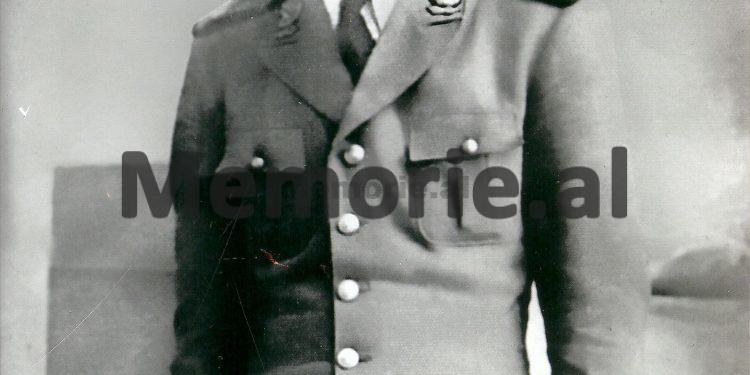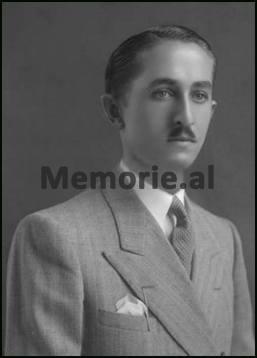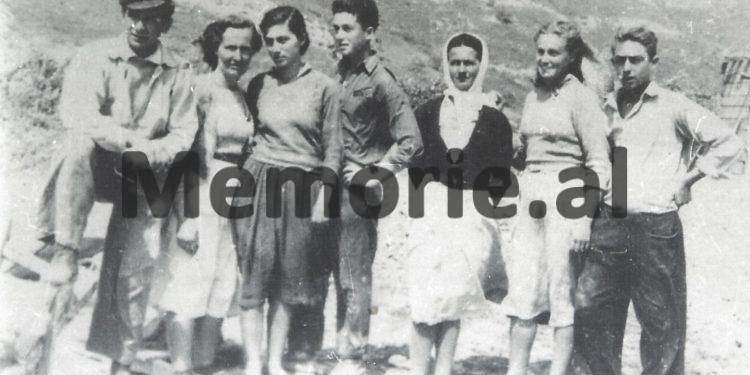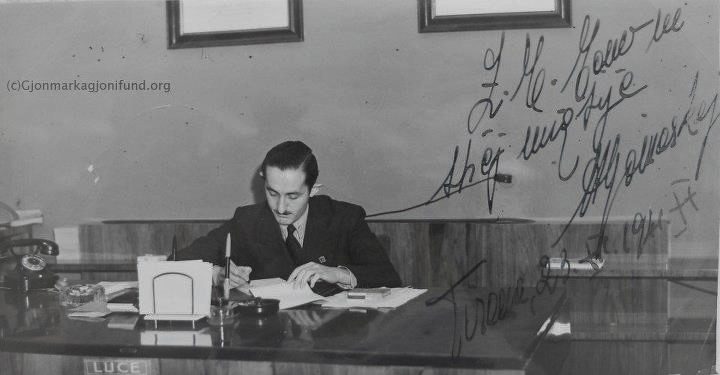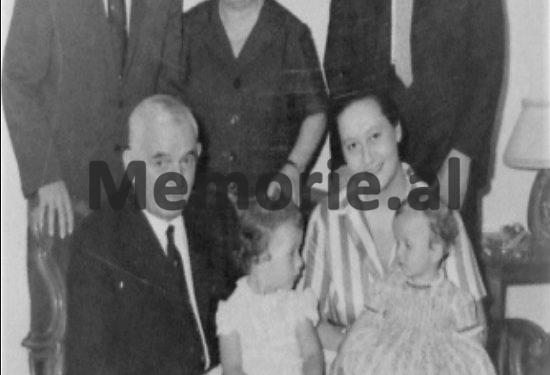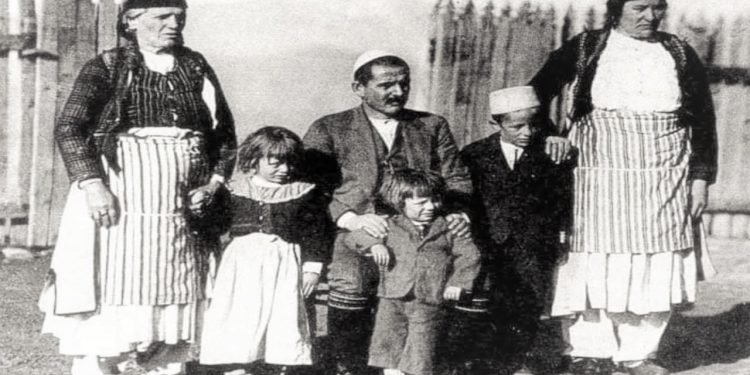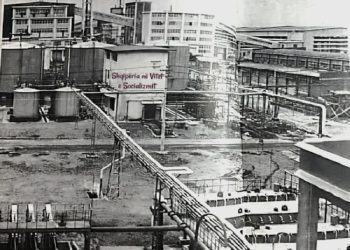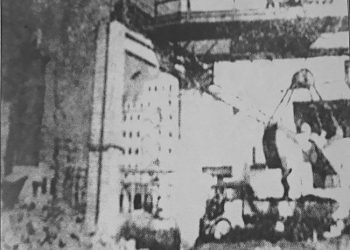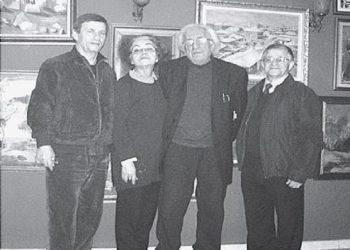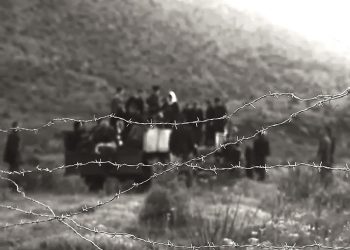From Eugen SHEHU
Memorie.al / The great door of the Mirdita chieftains, that door that would stand firm and unyielding against centuries-old storms, inherited the rare virtues of our nation through the ages. Inseparable from emblematic bravery, this family was equally distinguished for the generosity and honesty that characterized generations in a row, coming down to the generation of the beginning of the last century, whose scions, besides the virtues inherited from their fathers, also demonstrated resolute anti-communism. This anti-communism, as a spiritual value, shines in the darkness of the years 1940-1950, announcing to all of Southeast Europe that the Gjonmarkaj family has anti-communism born in their genes. In this generation, Preng Gjonmarkaj will always be in the front ranks of anti-communism.
Prenga was born in 1913, in the remote village of Ndërshen, in Orosh of Mirdita, in the mother state, where the news of the birth of the first son in the tower would be announced with gunshots, in which case wishes for one more chieftain in the family would not be delayed. On this day of joy, Prenga’s father, Dedë Gjonmarkaj, was not at home. He had participated in a series of battles for the autonomy of Albania, in the years 1904-1912.
His rifle was known to the Turkish authorities, especially in the city of Shkodra and its surroundings, where the Gjonmarkaj family had faced entire garrisons of the crescent not without success. Many times, some Ottoman units, especially in the years 1909-1911, had pursued the Gjonmarkaj family from Shkodra, but they had never been able to enter Mirdita. Furthermore, in the years 1911-1912, at the head of a handful of men from Orosh, Ded Gjonmarkaj ran towards the Albanian ethnic borders, defending them with a gun in hand, against both Montenegrins and Serbs. Wounded but fearless, in November 1912, Deda would travel to Vlora, to protect the first Albanian government. His friendship with the brave men of heroic Kosovo and especially with Isa Boletini, led Ded Gjonmarkaj to participate in the defense of the city of Vlora, especially from the Greek forces, which had reached only 20 km away from the birthplace of the first Albanian government, headed by Ismail Bey Vlora. Furthermore, in the years 1913-1914, together with other Albanian patriots, the distinguished man of the Gjonmarkaj family would show bravery in dozens and dozens of battles, both against the Hellenic hordes of Athens and against Serbo-Slavic chauvinistic intentions.
In his childhood, Prenga was rarely seen with his father. He would often recall later that when he happened to see his father, he would rush to take his gun or touch the blessed uniform of the Albanian National Army. In 1920, young Prenga would take the path of knowledge. He hurried to the benches of the Orosh Dormitory, a school opened specifically for Mirdita residents by the Captain of Mirdita, Gjon Markagjoni. I think we should not forget the fact that this dormitory was not only for Mirdita students but also for others who came from the northern regions of Kosovo and Albanian Macedonia, and it was free. The teachers paid by the Captain of Mirdita had the primary duty to teach their students to love Ethnic Albania, just as they loved the hearths from which they came. The school years would pass without a sound for young Prenga. He would not be separated from his family, as Ndërshen was not far from the school, while he would certainly see his father less often, due to his difficult duties in the ranks of the Albanian National Army. Prenga was in the last year of his studies, in Orosh, when in September 1928, the Monarchy was proclaimed in Tirana.
“The ideas and program of Legality, which entered the flow of Albanian politics in the 1920s, turned into an undeniable reality under the leadership of His Majesty, Zog I, thus laying the foundations of the first Albanian state…! Thus for the first time in its history, the Albanian felt himself organized in a democratic state whose rights were guaranteed by a European democratic constitution.” (Newspaper “Atdheu” Tirana, July 5, 1998). Already for the Albanian youth, the great doors of knowledge, hope, and progress were opening.
The 16-year-old Prenga would ask his father to continue his military studies, and the distinguished man would support his son, even though he himself had passed and was passing a life full of ups and downs in the ranks of the Albanian National Army. “After finishing the unique school in the Orosh dormitory in 1929, Preng Gjonmarkaj was sent to attend a military course for the gendarmerie, which was opened at that time by King Zog and under the care of Italian institutions, in Plepa of Durrës.” (Newspaper “55” Tirana, November 2, 2002). With a determined character, extremely strict against any kind of arrogance, Preng Gjonmarkaj would train with intensity, demonstrating that to be enlisted in the ranks of the Albanian Army, it is not enough just to be from a family of brave men. At the same time, bravery is worth coexisting with sacrifice, knowledge, and holy love for the homeland. Since Preng Gjonmarkaj’s results in the Gendarmerie school in Durrës were extremely high, by order of the Minister of the Interior at that time, in April 1931, the son of Mirdita would receive the rank of second lieutenant and would be appointed as commander of the Gendarmerie Post in the village of Lis, Mati. Although young in age and duty, Prenga would reveal the sacred patriotic education that came from his family, as well as dedication to duty. Two years later, thanks to his skills and honesty in duty, the son of the distinguished generation of Mirdita captains was appointed to the function of Gendarmerie Inspector at Zog’s Royal Court. In this function, he would have the fortune not only to meet but to cooperate for years on end with the King of Albanians, Ahmet Zogu. In his appointment on this occasion, in the file located in the Central State Archive in Tirana, among other things, it is written: “He is persistent in carrying out even the most difficult duties in the Albanian gendarmerie force to the end, with every sacrifice.”
By order of King Zog, Preng Gjonmarkaj participated in the investigations regarding the rebellion of 1935 against the Monarchy system. In close cooperation, especially with Ali Riza Kosova, Prenga was able to uncover the real causes of the so-called Fier Uprising, paralyzing its spread in time, especially in the south of the mother state. A series of documents prove the great abilities of Preng Gjonmarkaj to prevent in time all extreme actions, which in most cases, instigated by external factors, had the sole purpose of destabilizing the Albanian Monarchy and consequently, destroying the Albanian future. However, as strict as he was in his investigation, he was just as humane as a military man when it came to sentencing Albanians. It is already known that many of the plotters of the Fier rebellion were pardoned by King Zog within a few months. Here, Ali Riza Kosova, Preng Gjonmarkaj, and other Albanian patriots, in the formations of the army of that time, undoubtedly had an influence.
In April 1939, when fascist Italy occupied Albania, Preng Gjonmarkaj was in the ranks of the Albanian gendarmes, who faced the occupier, but this confrontation would be almost fragmented, in front of 40 thousand Italian soldiers armed with bomber planes. The continuation of the war by the Albanian Army could not be understood otherwise than as an adventure. With the call of the Italian High Command, that Albanian officers should not leave the army, Preng Gjonmarkaj, with a gun on his belt, headed for his homeland, putting aside his military career, but, even here, he could not stand by and watch his homeland suffer from the boot of the occupier.
He immediately began organizing the armed uprising, convinced that the overthrow of the Monarchy by fascism and the departure of King Zog from Albania were a bad omen for the homeland. He had to run through the villages of Mirdita, agitating on the anti-Italian front. With the help of his friends, who knew his organizational skills, he was elected in 1940 as the mayor of the Fan area in Mirdita. Always guided by the valuable moral values and virtues of our nation, he undertook a series of initiatives in Fan to end blood feuds and reconcile them. There are several well-known tribes in this region that, after a centuries-old blood feud, sat next to each other and extended their hands in the presence of the mayor, Preng Gjonmarkaj.
In all these meetings in the Mirdita towers, the man from Orosh would emphasize the idea that: “the more united we are, the sooner we will be able to expel Italy from our country.” In June 1941, Prenga was called to Tirana and informed of a new function in the Albanian administration. He was appointed to the position of head of the Political Office at the Ministry of Internal Affairs. Since this position corresponded to the function of deputy minister, Preng Gjonmarkaj was also given the rank of major. Although from the beginning of 1941 until November 1944, several Albanian governments changed, Major Preng Gjonmarkaj performed his duty with devotion, trying at all costs to preserve and strengthen order and public peace in Albania.
In a telegram he sent to gendarmerie posts throughout the country, among other things, in April 1943, he wrote: “Let’s try to face communist propaganda with every means. Don’t let the communists lie and deceive the people, but coolly and not with the barrel of a gun, let’s expose these disgusting Bolsheviks.” (Archive of the Ministry of Internal Affairs-Tirana. Gendarmerie Fund year 1943).
In the aforementioned function, Preng Gjonmarkaj would influence with his ideas and activity not only in the mother state but also in Kosovo and Albanian Macedonia. In close cooperation, especially with the prominent personality of Kosovo, Xhafer Deva, he would announce a series of measures for the functioning of patriotic ideas throughout the territory of Ethnic Albania. His care, especially for providing proper assistance to the nationalist formations of the National Defense, who had taken it upon themselves to protect the ethnic borders, was notable. In a special way against the Serbo-Slavs and Bulgarians, he himself undertook trips to these regions, trying to help these formations to the end and coordinating the work with the other patriotic groups that were operating separately in these areas.
Prenga would also unreservedly support the creation of the Second Albanian League of Prizren, publicly welcoming it. With the occupation of the country by the communist dictatorship in November 1944, Prenga joined the group of his cousin, Mark Gjonmarkaj. There were about 200 men from Mirdita who had sworn to fight the communist beast until death. For a full six months, this group roamed Northern Albania, clashing day and night with the communist bands and the so-called People’s Defense Division, which in reality was transformed into a division for the execution of Albanian patriots and anti-communists.
In all these battles, Preng Gjonmarkaj would always be in the front ranks of the fighters, intuitive and courageous. Especially in the fighting in the place called Kthellë e Epërme, he would get about 70 men from Mirdita out of the encirclement, leaving several dozen effective military personnel of the Defense Division forces, who had gone to surround and kill them, dead.
Thus, it came to May 18, 1945, when, surrounded by 1200 communist forces, a handful of Mirdita men began the fight in Shllak of Shkodra. But the communists had surrounded them from all sides. Since there were also 4-5 nationalist boys in the group, about 17-18 years old, Prenga thought of saving the young lives. When all the cartridges were gone, he was the first to shout to the communists not to shoot at the boys, because he had led them in every fight and took on the entire burden of their actions.
They immediately arrested him, and after inhuman tortures, the anti-communist Preng Gjonmarkaj was brought to trial in the city of Shkodra. In the file with his name, which is in the Archive of the Ministry of Internal Affairs, in the indictment of the infamous State Security, among other things, it is written: “The aforementioned Pren Gjonmarkaj has cooperated with criminals like Xhafer Deva, Rexhep Mitrovica, Mark Gjonmarkaj, Kol Tromara, Hysni Dema, etc., fighting the communist movement not only in Tirana, but in all Albanian lands. He has supported and welcomed the traitorous organization of the Second League of Prizren, and has even had close relations with the main leaders of this criminal organization, which wanted to undermine the friendship of our people with the Yugoslav one, in complete contradiction with the course followed by the Yugoslav and Albanian Communist Party.”
After this accusation, in the public cinema of the city of Shkodra, while the “enthusiastic” crowds shouted loudly: “down with the criminals,” the chairman of the judicial panel, the sadistic criminal Aranit Çela, announced the death sentence of Preng Gjonmarkaj. While the defense of the accused Preng Gjonmarkaj, with convincing arguments, rejected all the accusations, and even highlighted through facts the patriotism of the Mirdita man, and the honored military officer of the Albanian Monarchy. The sham of the communist trials of Tirana was immediately shattered by the undeniable truths of the activity that Albanian patriots had carried out for the benefit of their nation.
And yet to their shame, after listening to the defense of Preng Gjonmarkaj, the communist judges changed the decision from a death sentence to a 101-year prison sentence and the confiscation of his family’s immovable property. So from 1945 until the end of his life, the anti-communist Preng Gjonmarkaj suffered the terrible ordeal of communist prisons built according to the models of Stalinist prisons, those mass death camps took the lives of thousands of Albanian nationalists, who, although they fought against the Italians, Serbo-Slavs, Bulgarians, and Greeks, would be trampled and tortured as enemies, for their determined anti-communism. This spiritual and moral value was thus bled by the new Albanian Bolsheviks, whose eyes were lit by Belgrade. Those who knew Preng Gjonmarkaj in the prisons of Albania also preserve their best memories of his determined character. One of the prisoners who suffered with him, Mark Alia from Mamurasi, said that the commander of the Burrel camp, Novruz Shehu, wanted to intervene with Kadri Hazbiu and release Prenga, as he commanded the respect of everyone. When he returned from Tirana, the camp commander, in the presence of all the convicts, told Prenga: “As long as this government exists, you will not be released. We know that you have not committed crimes, but your last name keeps you inside.” After these words, Prenga smiled and replied: “I know that well, but my last name is more sacred to me than my life, Major!”
When the communist dictatorship collapsed in the mother state, Preng Gjonmarkaj was living his last days. There in remote Orosh, although weak and old from almost five decades of communist torture, breathing the fresh air of freedom, he could not get enough of remembering everything he had gone through in these mountains in his youth. “God must have loved me,” he told his relatives and friends, “since he brought me to free Orosh, without communists.” With such comfort, he closed his eyes in October 1992, surrounded by the human love of hundreds of Mirdita residents, who accompanied Preng Gjonmarkaj to the afterlife. Memorie.al




